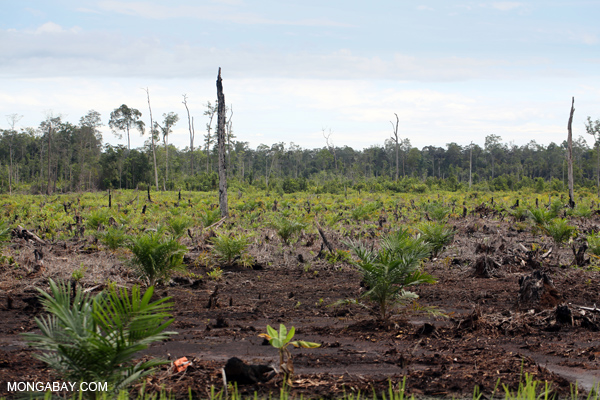Villagers in Indonesia’s Central Kalimantan province occupied a local government office last week, fed up with the government’s lack of action to resolve a long-running land dispute with palm oil company PT Rezeki Alam Semesta Raya.
Around 29 villagers occupied the Kuala Kapuas district head office in Central Kalimantan on Thursday. The residents of Sei Ahas, Katimpun, Kalumpang and Pulau Kaladan villages demanded the company return nearly 3,000 hectares of customary land, which they said was taken from them without their consent.
The occupation came after years of frustrated attempts by the villagers to negotiate with the company and the government for their lands to be returned. Rezeki Alam Semesta Raya (RASR) began operating in Kuala Kapuas district in 2004, and residents of the four villages in Mantangai subdistrict have been demanding the return of their customary lands ever since – sending letters, attending mediation meetings and holding demonstrations, all to no avail.

New oil palm plantation cleared from peat forest in Indonesia’s Central Kalimantan Province in 2013. Photo by Rhett A. Butler.
The company’s license was revoked in 2010 by the Kuala Kapuas district head, the villagers told Mongabay-Indonesia last week, and a letter by the Central Kalimantan governor on July 28 this year ordered them to halt all operations in the district linked to unresolved disputes. However, despite these legal victories for the community, the company has continued to operate in the area and has not yet returned any land to residents.
“Based on the decision in the letters [from the district head and the governor], the company has to stop operations and restore our rights to our customary land,” community action coordinator Porok C. Tuwe said.
The villagers attended another mediation meeting on Wednesday last week, one day before deciding to occupy the district head’s office. The National Land Agency (BPN), the Kuala Kapuas District Legislative Council (DPRD), the district plantation agency and the district police chief all attended the meeting – but no representative of the company came.
“The mediation meeting was not encouraging, PT RASR did not come,” Musradi, a resident of Sei Ahas village, said. “We’ve tried many times to hold mediation meetings, and they only came one time to a meeting in the province last September.”
Residents said they would not accept compensation from the company for their lost land and would not leave the office until their land was returned. “If after three days we still don’t have an answer, we will take another floor. We will evict the company from our customary land,” Musradi said.

Nginap citizen protests and Mantangai in Kapuas District Office, Central Kalimantan. Photo: Indra Nugraha, Mongabay-Indonesia.
In a separate conflict in Mantangai subdistrict, two villagers were reported to the police last month for pulling up oil palms planted by PT Usaha Handalan Perkasa (UPH) and replanting the area with rubber trees, according to a video posted online by Save Our Borneo, a Central Kalimantan-based environmental NGO. The two villagers, together with other local residents, were attempting to reclaim customary land that they say was taken from them without their consent.
Like the occupation of the district head office, the action against UPH came after years of failed negotiations between the residents and the company. The video showed the latest attempt at mediation, which took place in the Mantangai subdistrict head office on Sept. 9. In the video, a resident tries to explain to a local government official that the company began its operations without carrying out the necessary “socialization” – the word commonly used for the consent process in Indonesia – with local residents.
In response to the allegation, a company representative told the villagers that they “didn’t need to know” about the licensing issues and that it was “a matter between our company with the government.”
In the end, the community members decided not to join the mediation meeting, which was meant to address just the charges against the two villagers for destroying the oil palms and not the broader land issues, after subdistrict officials said only two representatives from the community could attend.
SOURCE: Lahan Adat Dicaplok Sawit, Puluhan Warga Mantangai Nginap di Kantor Bupati
Related articles